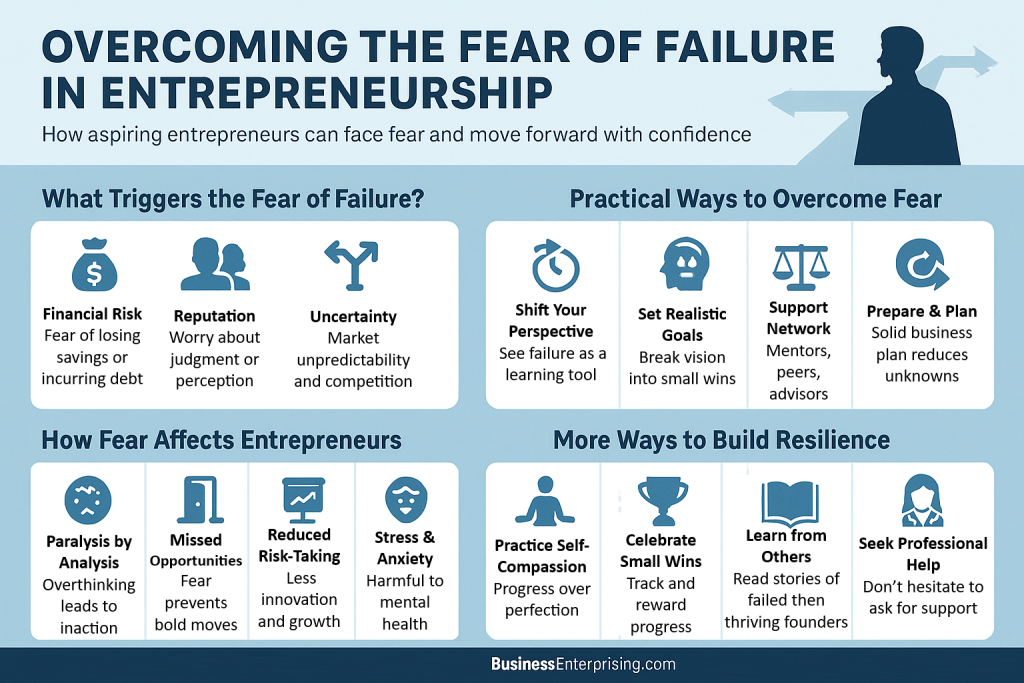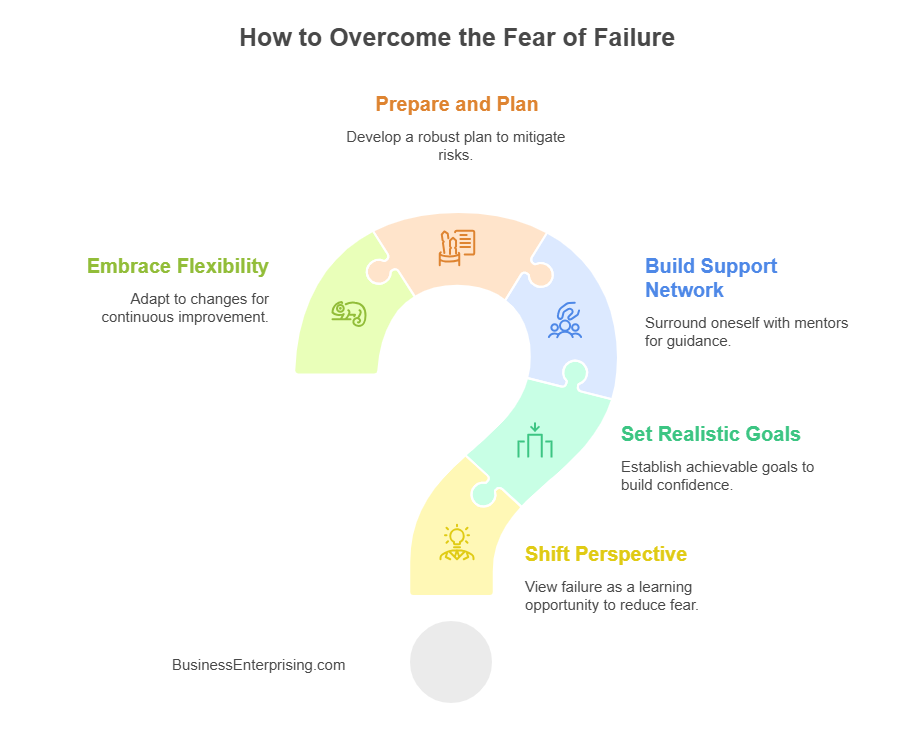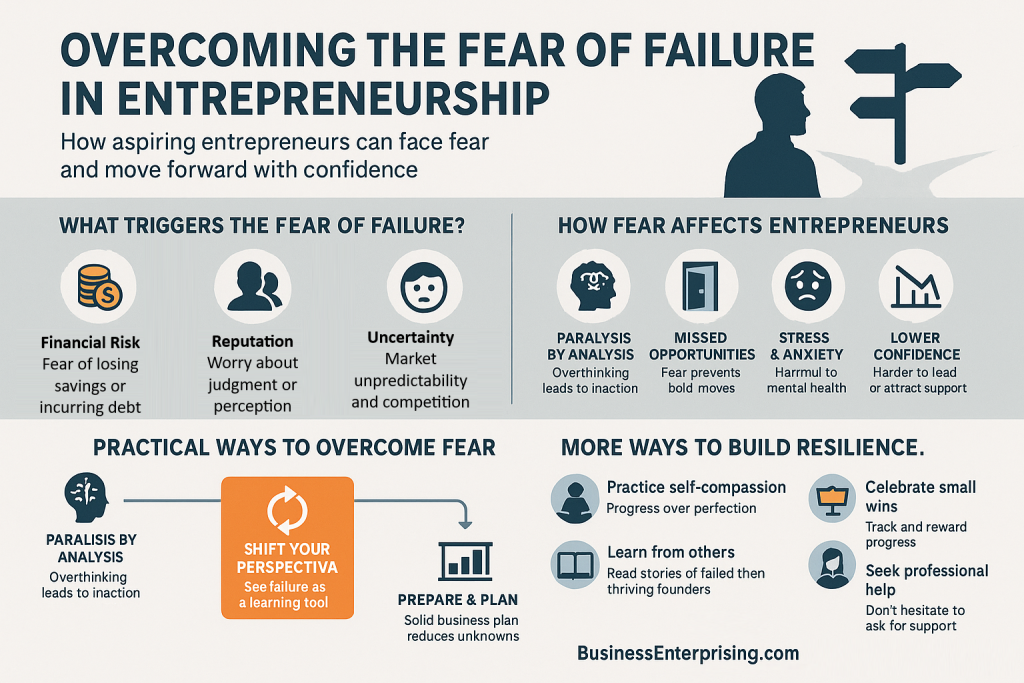Starting a business is a bold endeavor that requires courage, vision, and determination. However, one of the most pervasive and challenging obstacles that aspiring entrepreneurs face is, undeniably, the fear of failure. This fear can be paralyzing, preventing potential business owners from taking the necessary steps to turn their ideas into reality.
Understanding the Fear of Not Succeeding
The fear of failure, or atychiphobia, is a psychological condition characterized by an intense fear of not achieving one’s goals. For entrepreneurs, this fear often stems from several sources:
Financial Risk: Firstly, Starting a business involves significant financial investment. The possibility of losing one’s savings, accumulating debt, or facing financial instability can be daunting.
Reputation Concerns: Entrepreneurs also worry about how failure might affect their personal and professional reputation. The fear of being perceived as unsuccessful or incompetent can be a significant deterrent.
Uncertainty and Risk: Another key point to remember is that the entrepreneurial journey is fraught with uncertainties and risks. The unpredictability of market conditions, competition, and consumer preferences can amplify the fear of failure.
Self-Doubt: Additionally, many aspiring entrepreneurs struggle with self-doubt and imposter syndrome, questioning their abilities and the viability of their ideas. This internal struggle can magnify the fear of failure.
Pressure to Succeed: Entrepreneurs often face pressure from themselves, their families, and their peers to succeed. This pressure can heighten the fear of not meeting expectations.
Impacts of Fear
Failure can have profound impacts on aspiring entrepreneurs and their potential ventures. One common effect is paralysis by analysis. The fear of making mistakes may cause overthinking and indecision. Entrepreneurs often spend too much time analyzing every detail, which delays important decisions and actions. Additionally, fear can lead to missed opportunities. It can prevent entrepreneurs from seizing chances, trying new ideas, or adjusting their strategies. This hesitation frequently stifles innovation and limits growth.
Another consequence is reduced risk-taking. Because entrepreneurship involves uncertainty, the fear of failure can result in overly cautious behavior. This reduces the likelihood of bold, transformative decisions. Moreover, constant worry about failure can contribute to elevated stress and anxiety, affecting mental health and overall well-being. Finally, persistent fear often leads to lower self-confidence. This erosion of confidence makes it harder to lead a business, motivate a team, or attract customers and investors.
Overcoming the Fear of Failing
While the fear of failing is a common and natural emotion, it is essential to manage and overcome it to achieve entrepreneurial success. One effective strategy is to shift the perspective on failure. Instead of seeing it as a definitive end, entrepreneurs should view failure as a valuable learning opportunity. Many successful business leaders have encountered setbacks and used them as stepping stones toward future achievements. By recognizing that failure is part of the journey, the fear surrounding it becomes less intimidating.
Another helpful approach is setting realistic goals. Breaking down a large vision into achievable, incremental tasks can make the process feel less overwhelming. This method builds confidence and helps entrepreneurs maintain momentum. Additionally, building a strong support network is critical. Engaging with mentors, advisors, and like-minded peers offers encouragement, perspective, and practical guidance. Sharing fears and challenges with trusted individuals often alleviates anxiety and fosters resilience.
Preparation and planning also play a significant role in managing fear. A well-structured business plan, thorough market research, and contingency strategies can help reduce uncertainty and boost confidence. Lastly, embracing flexibility and adaptability allows entrepreneurs to respond effectively to change. Accepting that things will not always go according to plan relieves pressure and creates space for growth and improvement. These strategies, when combined, can empower entrepreneurs to face their fears and move forward with clarity and purpose.
Other Recommendations
Focusing on the process rather than just the outcome can help reduce fear and create a more balanced entrepreneurial mindset. By concentrating on the actions and efforts required to achieve goals, rather than obsessing over the end result, entrepreneurs can alleviate pressure and stay grounded in their daily progress. Adopting this process-oriented approach fosters greater consistency and reduces the anxiety associated with achieving perfection.
Practicing self-compassion is also essential. Entrepreneurs should recognize that perfection is unrealistic and that mistakes are an inevitable part of growth. Being kind to oneself during setbacks helps diminish the fear of failure and builds emotional resilience. Along the journey, celebrating small wins is equally important. Taking time to acknowledge progress, no matter how minor, can significantly boost confidence and motivation.
Learning from others can provide valuable perspective and encouragement. Studying the paths of successful entrepreneurs—especially their challenges and failures—can offer reassurance and actionable lessons. It serves as a reminder that setbacks are common and can be overcome. Finally, if fear becomes overwhelming or begins to impact mental health, seeking professional help from a counselor or business consultant can be highly beneficial. Expert guidance can offer tools and techniques to manage fear effectively and maintain focus on long-term success.
Overall, the fear of failure is a significant and common challenge for aspiring entrepreneurs. However, it is not an insurmountable obstacle. By understanding the sources of this fear and implementing strategies to manage and overcome it, entrepreneurs can navigate their journey with greater confidence and resilience. Embracing failure as a part of the entrepreneurial process, preparing thoroughly, and building a supportive network are crucial steps in transforming fear into a driving force for success. With the right mindset and approach, entrepreneurs can turn their fear into a catalyst for innovation, growth, and ultimately, success.



